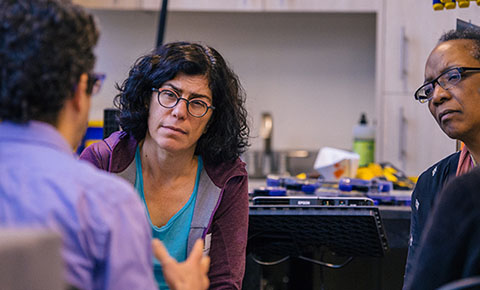Coburn Wins Ver Steeg Research Fellowship

Education sociologist Cynthia Coburn received Northwestern University’s Dorothy Ann and Clarence L. Ver Steeg Distinguished Research Fellow award for her work improving relationships between education researchers and schools.
The $40,000 research award supports research and scholarship by a tenured Northwestern professor that enhances the national and international reputation of the University. It comes on the heels of Coburn’s election to the National Academy of Education, one of the highest honors in the field.
Coburn, professor of human development and social policy and of learning sciences, is the second winner in School of Education and Social Policy history. She joins professor James Spillane who received the award in 2013 for his work exploring how policies are put into place in classrooms, schools, districts, and at the state level.
A world-renowned expert on partnerships between researchers and those working in the field - including teachers, principals, and district leaders – Coburn has helped spark a renaissance in the field of educational research.
She focuses on understanding how schools and systems change. As they do, she wants to know how the new practices, rules, and roles weave through the system and make their way into classrooms.
Coburn also studies whether teachers and others respond to these policies by transforming, disrupting, or even reproducing the status quo that the new guidelines were designed to change.
“Ultimately, we want to understand what helps and hinders how we use research in policymaking and to create tools and resources so practitioners can use this evidence in their classrooms and schools,” she said.
Coburn is co-editor of Research and Practice in Education: Building Alliances, Bridging the Divide, and an author of nearly fifty articles. She is the principal investigator for several major grants, including from the William T. Grant Foundation, the Spencer Foundation, the John D. and Catherine T. MacArthur Foundation, and the Institute for Education Sciences.
She is currently in the middle of what she called “the most complicated study” she’s ever tackled - one that looks at how organizations can bridge the gap between pre-K and K-12 math instruction.
“We essentially have two very separate systems under the same rubric of school districts,” she said. “You can have a pre-school inside a K-12 building that has completely separate schedules, food, transportation, and professional development for teachers.
“Yet we know from the way kids learn that it would be very helpful if the learning in pre-k was scaffolded and built upon in kindergarten, first and second grade.”
The research is part of her work with the interdisciplinary collaboration Development and Research in Early Math Education, or DREME.
DREME allows Coburn and her colleagues to bring together experts from different fields to share resources and holistically dive into research questions. They’re also growing the field by including more junior scholars.
"By sharing what we’re learning crossing disciplinary lines, we’re creating a funding strategy where the whole is bigger than the parts,” Coburn said.
Connecting Researchers and Educators
In addition to examining curriculum implementation, Coburn also studies efforts to better connect researchers and school districts, which are known as research-practice partnerships. If we want to understand how research gets into the classroom, we need to know how researchers and educators interact, Coburn says.
School districts can be challenging places to implement new research findings because administrators are under pressure from the public, and it’s often difficult to incorporate new knowledge into ongoing ways of doing things.
In several studies, Coburn has shown that teachers who discussed policy ideas with colleagues of differing backgrounds “were more likely to rethink their existing approaches to instruction rather than implement ideas by layering them on top or rejecting them,” she said.
"People try to help public schools all the time and almost flood them with assistance," Coburn added. "But if there's not a set of conditions that enable people to learn from them, it's kind of a waste of money.”
The most critical part of education is what happens in the classroom between teachers and children every day, said Coburn. "But you're not going to change outcomes for kids unless you understand how to improve teaching and learning for them.”